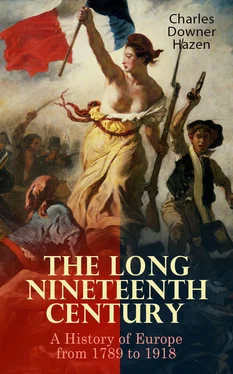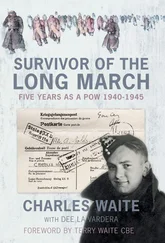The work of reform carried out by the Constituent Assembly was on an enormous scale, immensely more extensive than that of our U. S. Federal Convention. We search history in vain for any companion piece. It is unique. Its destructive work proved durable and most important. Much of its constructive work, however, proved very fragile. Mirabeau expressed his opinion in saying that "The disorganization of the kingdom could not be better worked out."
There were other dangerous features of the situation which inspired alarm and seemed to keep open and to embitter the .relations of various classes and to foster opportunities for the discontented and the ambitious. The legislation concerning the Church proved highly divisive in its effects. It began with the the confiscation of its property; it was continued in the attempt profoundly to alter its organization.
The States-General had been summoned to provide for the finances of the country. As the problem grew daily more pressing, as various attempts to meet it proved futile, as bankruptcy was imminent, the Assembly finally decided to sell for the state the vast properties of the Church. The argument was that the Church was not the owner but was merely the administrator, enjoying only the use of the vast wealth which had been bestowed upon it by the faithful, but bestowed for public, national purposes, namely, the maintenance of houses of worship, schools, hospitals; and that if the state would otherwise provide for the carrying out of the intentions of these numerous benefactors, it might apply the property, which was the property of the nation, not of the Church as a corporation, to whatever uses it might see fit. Acting on this theory a decree was passed by the of the Assembly declaring these lands national. They constituted perhaps a fourth or a fifth of the territory of France and national represented immense wealth, amply sufficient, it was believed, to set the public finances right.
But such property could only be used if converted into money and that would be a slow process, running through years. The expedient was devised of issuing paper money, as the government needed it, against this property as security. This paper money bore the name of assignats. Persons receiving such assignats could not demand gold for them, as in the case of most of our paper money, but could use them in buying these lands. There was value, therefore, behind these paper emissions. The danger in the use of paper money, however, always is the inclination, so easy to yield to, to issue far more paper than the value of the property behind it. This proved a temptation which the revolutionary assemblies did not have strength of mind or will to resist. At first the assignats were issued in limited quantities as the state needed the money, and the public willingly accepted them. But later larger and larger emissions were made, far out of proportion to the value of the national domains. This depreciation meant the rapid depreciation of the paper. People would not accept it at its face value, as they had at first been willing to do. The value of the Church property was estimated in 1789 as 4,000,000,000 francs. Between 1789 and 1796 over 45,000,000,000 of assignats were issued. In 1789 an assignat of 100 francs was accepted for 100 francs in coin. But by 1791 it had sunk from par to 82, and by 1796 to less than a franc. This was neither an honest nor an effective solution of the perplexing financial problem. It was evasion, it was in its essence repudiation. The Constituent Assembly did nothing toward solving the problem that had occasioned its meeting. It left the national finances in a worse welter than it had found them in.
Another piece of legislation concerning the Church, much more serious in its effects upon the cause of reform, was the Civil Constitution of the Clergy. By act of the Assembly the number of dioceses was reduced from 134 to 83, one for each department. The bishops and priests were henceforth to be elected by the same persons who elected the departmental officials. Once elected, the bishops were to announce the fact to the Pope who was not to have the right to approve or disapprove but merely to confirm. He was, then, to recognize them. If he refused, the ordinary courts could be invoked. The clergy were to receive salaries from the state, were, in other words to become state officials. The income of most of the bishops would be greatly reduced, that of the parish priests, on the other hand, would be considerably increased.
This law was not acceptable to sincere Catholics, since it altered by act of politicians an organization that had hitherto been controlled absolutely from within. Bishops and priests were to be elected like other officials - that is Protestants, Jews, free thinkers might participate in choosing the religious functionaries of the Catholic Church. Judges, who might, perhaps, be infidels, might yet play a decisive part. The Pope was practically ignored. His nominal headship was not questioned. His real power was largely destroyed. He would be informed of what was happening; his approval would not be necessary.
The Assembly voted that all clergymen must take an oath to support this Civil Constitution of the Clergy. Only four of the 134 bishops consented to do so. Perhaps a third of the parish priests consented. Those who consented were called the juring, those who refused, the non-juring or refractory clergy. In due time elections were held as provided by the law and those elected were called the constitutional clergy. France witnessed the spectacle of two bodies of priests, one non- juring, chosen in the old way, the other elected by the voters indirectly. The scandal was great and the danger appalling, for religious discord was introduced into every city and hamlet. Faith supported the one body, the state supported the other and the state embarked upon a long, gloomy, and unsuccessful struggle to impose its will in a sphere where it did not belong.
Most fatal were the consequences. One was that it made the position of Louis XVI, a sincere Catholic, far more difficult and exposed him to the charge of being an enemy of the Revolution, if he hesitated in his support of measures which he could not and did not approve. Another was that it provoked in various sections, notably in Vendee, the most passionate civil war France had ever known. Multitudes of the lower clergy, who had favored and greatly helped the Revolution so far, now turned against it for conscience' sake. We cannot trace in detail this lamentable chapter of history. Suffice it to say that the Constituent Assembly made no greater or more pernicious mistake. The Church had, as the issue proved, immense spiritual influence over the peasants, the vast bulk of the population. Henceforth there was a divided allegiance - allegiance to the State, allegiance to the Church. Men had to make an agonizing choice. The small counter-revolutionary party of the nobles, hitherto a staff of officers without an army, was now reinforced by thousands and millions of recruits, prepared to face any revolutionary sacrifices. And worldly intriguers could draw on this fund of piety for purposes which were anything but pious. The heat generated by politics is sufficient. There was no need of increasing the temperature by adding the heat of religious controversy. French Revolution or eternal damnation, such was the hard choice placed before the devout.
"I would rather be King of Metz than remain King of France in such a position," said Louis XVI, as he signed the decree requiring an oath to Civil Constitution of the Clergy, "but this will end soon." The meaning of which remark was that the King was now through with his scruples, that he was resolved to call the monarchs of Europe to his aid, that he was determined to escape from this coil of untoward events which was binding him tighter and tighter, threatening soon to strangle him completely. The idea of a royal flight was not new. Marie Antoinette had thought of it long before. Mirabeau had counseled it under certain conditions which, however, were no longer possible. The nobles who had fled from France, some of them after the fall of the Bastille, more of them after the war upon the chateaux, hung upon the fringes of the kingdom, in Belgium, in Piedmont, and particularly in the petty German states that lined the fabled banks of the Rhine, eager to have the King come to them, eager to embroil Europe with France, that thus they might return to Paris with the armies that would surely be easily victorious, and set back the clock to where it stood in 1789, incidentally celebrating that happy occurrence by miscellaneous punishment of all the notable revolutionists, so that henceforth imaginative spirits would hesitate before again laying impious hands upon the Lord's anointed, upon kings by divine right, upon nobles reposing upon rights no less sacred, upon the holy clergy. The Count of Artois, the proud and empty-headed brother of the King, one of the first to emigrate, had said: "We shall return within three months." As a matter of fact he was to return only after twenty-three years, a considerable miscalculation, pardonable, no doubt, in that extraordinary age in which every one miscalculated.
Читать дальше












